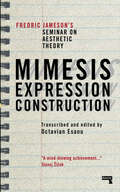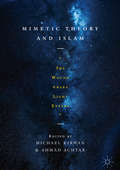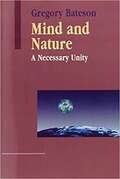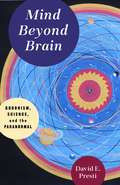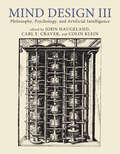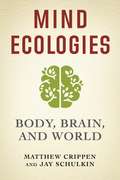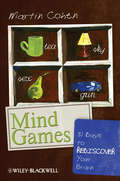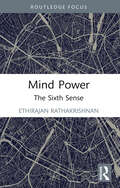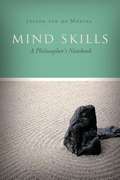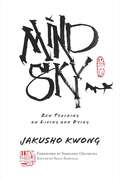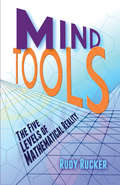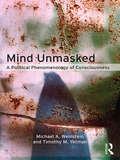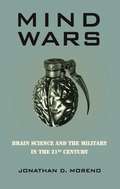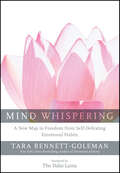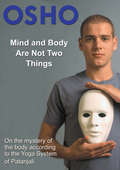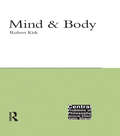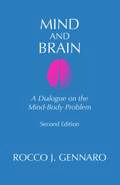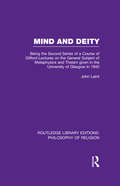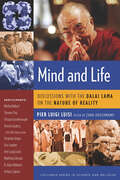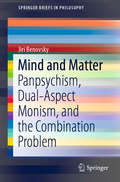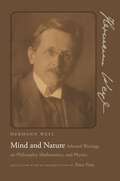- Table View
- List View
Mimesis, Expression, Construction: Fredric Jamesons Seminar on Aesthetic Theory
by Fredric JamesonMimesis, Expression, Construction brings Fredric Jameson's famous Duke University seminar on Adorno&’s Aesthetic Theory into print for the first time.Transcribed and edited from audio recordings taken by Octavian Esanu of the original seminar at Duke University in 2003, Mimesis, Expression, Construction reproduces Jameson and his students' engagement with Aesthetic Theory, one of the most influential theories of modernist aesthetics.The first and only published record of Jameson's teaching and pedagogic style, the seminar delves into modern and modernist aesthetics through the perspectives of Kant, Hegel, Freud, Schopenhauer, and Nietzsche; Benjamin and other members of the Frankfurt School; the literary works of Thomas Mann and Samuel Beckett; the music of Schoenberg, Webern and Berg; the films of Chaplin, Vertov and Eisenstein; the aesthetic implications of psychoanalysis and biblical exegesis; classical music; and more.Presented in the format of a play, with stage setting, student interruptions and exchanges, interjections, auditory noises, and ambient sounds, and complemented with scans of students' notes, Mimesis, Expression, Construction is a groundbreaking addition to the work of one of the greatest modern cultural critics.
Mimetic Theory and Islam: "The Wound Where Light Enters"
by Michael Kirwan Ahmad AchtarThis volume explores the 'Mimetic Theory' of the cultural theorist René Girard and its applicability to Islamic thought and tradition. Authors critically examine Girard's assertion about the connection between group formation, religion, and 'scapegoating' violence. These insights, Girard maintained, have their source in biblical revelation. Are there parallels in other faith traditions, especially Islam? To this end, Muslim scholars and scholars of Mimetic Theory have examined the hypothesis of an 'Abrahamic Revolution.' This is the claim that Judaism, Christianity, and Islam each share in a spiritual and ethical historical 'breakthrough:' a move away from scapegoating violence, and towards a sense of justice for the innocent victim.
Mind And Cosmos: Why The Materialist Neo-darwinian Conception Of Nature Is Almost Certainly False
by Thomas NagelThe modern materialist approach to life has conspicuously failed to explain such central mind-related features of our world as consciousness, intentionality, meaning, and value. This failure to account for something so integral to nature as mind, argues philosopher Thomas Nagel, is a major problem, threatening to unravel the entire naturalistic world picture, extending to biology, evolutionary theory, and cosmology. <p><p> Since minds are features of biological systems that have developed through evolution, the standard materialist version of evolutionary biology is fundamentally incomplete. And the cosmological history that led to the origin of life and the coming into existence of the conditions for evolution cannot be a merely materialist history, either. An adequate conception of nature would have to explain the appearance in the universe of materially irreducible conscious minds, as such. <p> Nagel's skepticism is not based on religious belief or on a belief in any definite alternative. In Mind and Cosmos, he does suggest that if the materialist account is wrong, then principles of a different kind may also be at work in the history of nature, principles of the growth of order that are in their logical form teleological rather than mechanistic. <p> In spite of the great achievements of the physical sciences, reductive materialism is a world view ripe for displacement. Nagel shows that to recognize its limits is the first step in looking for alternatives, or at least in being open to their possibility.
Mind And Nature: A Necessary Unity
by Gregory BatesonA re-issue of Gregory Bateson's classic work. It summarizes Bateson's thinking on the subject of the patterns that connect living beings to each other and to their environment.
Mind Beyond Brain: Buddhism, Science, and the Paranormal
by David PrestiAmong the most profound questions we confront are the nature of what and who we are as conscious beings, and how the human mind relates to the rest of what we consider reality. For millennia, philosophers, scientists, and religious thinkers have attempted answers, perhaps none more meaningful today than those offered by neuroscience and by Buddhism. The encounter between these two worldviews has spurred ongoing conversations about what science and Buddhism can teach each other about mind and reality.In Mind Beyond Brain, the neuroscientist David E. Presti, with the assistance of other distinguished researchers, explores how evidence for anomalous phenomena—such as near-death experiences, apparent memories of past lives, apparitions, experiences associated with death, and other so-called psi or paranormal phenomena, including telepathy, clairvoyance, and precognition—can influence the Buddhism-science conversation. Presti describes the extensive but frequently unacknowledged history of scientific investigation into these phenomena, demonstrating its relevance to questions about consciousness and reality. The new perspectives opened up, if we are willing to take evidence of such often off-limits topics seriously, offer significant challenges to dominant explanatory paradigms and raise the prospect that we may be poised for truly revolutionary developments in the scientific investigation of mind. Mind Beyond Brain represents the next level in the science and Buddhism dialogue.
Mind Design III: Philosophy, Psychology, and Artificial Intelligence
by John Haugeland, Carl F. Craver, and Colin KleinThe essential reader on the philosophical foundations and implications of artificial intelligence, now comprehensively updated for the twenty-first century.In the quarter century since the publication of John Haugeland&’s Mind Design II, computer scientists have hit many of their objectives for successful artificial intelligence. Computers beat chess grandmasters, driverless cars navigate streets, autonomous robots vacuum our homes, and ChatGPT answers existential queries in iambic pentameter on command. Engineering has made incredible strides. But have we made progress in understanding and building minds? Comprehensively updated by Carl Craver and Colin Klein to reflect the astonishing ubiquity of machine learning in modern life, Mind Design III offers an essential collection of classic and contemporary essays on the philosophical foundations and implications of artificial intelligence. Contributions from a diverse range of philosophers and computer scientists address the nature of computation, the nature of thought, and the question of whether computers can be made to think. With extensive new material reflecting the explosive growth and diversification of AI approaches, this classic reader equips students to assess the possibility of, and progress toward, building minds out of computers.New edition highlights: New chapters on advances in deep neural networks, reinforcement learning, and causal learningNew material on the complementary intersection of neuroscience and AIOrganized thematically rather than chronologically Brand new introductions to each section that include suggestions for coursework and further reading
Mind Ecologies: Body, Brain, and World
by Jay Schulkin Matthew CrippenPragmatism—a pluralistic philosophy with kinships to phenomenology, Gestalt psychology, and embodied cognitive science—is resurging across disciplines. It has growing relevance to literary studies, the arts, and religious scholarship, along with branches of political theory, not to mention our understanding of science. But philosophies and sciences of mind have lagged behind this pragmatic turn, for the most part retaining a central-nervous-system orientation, which pragmatists reject as too narrow.Matthew Crippen, a philosopher of mind, and Jay Schulkin, a behavioral neuroscientist, offer an innovative interdisciplinary theory of mind. They argue that pragmatism in combination with phenomenology is not only able to give an unusually persuasive rendering of how we think, feel, experience, and act in the world but also provides the account most consistent with current evidence from cognitive science and neurobiology. Crippen and Schulkin contend that cognition, emotion, and perception are incomplete without action, and in action they fuse together. Not only are we embodied subjects whose thoughts, emotions, and capacities comprise one integrated system; we are living ecologies inseparable from our surroundings, our cultures, and our world. Ranging from social coordination to the role of gut bacteria and visceral organs in mental activity, and touching upon fields such as robotics, artificial intelligence, and plant cognition, Crippen and Schulkin stress the role of aesthetics, emotions, interests, and moods in the ongoing enactment of experience. Synthesizing philosophy, neurobiology, psychology, and the history of science, Mind Ecologies offers a broad and deep exploration of evidence for the embodied, embedded, enacted, and extended nature of mind.
Mind Games
by Martin CohenThis original and innovative book is an exploration of one of the key mysteries of the mind, the question of consciousness. Conducted through a one month course of both practical and entertaining 'thought experiments', these stimulating mind-games are used as a vehicle for investigating the complexities of the way the mind works.By turns, fun, eye-opening and intriguing approach to thinking about thinking, which contains inventive and engaging 'thought experiments' for the general readerIncludes specially drawn illustrations by the French avant-garde artist, JuditReunites the social science disciplines of psychology, sociology and political theory with the traditional concerns of philosophy
Mind Power: The Sixth Sense
by Ethirajan RathakrishnanThis book explores the mysteries of the human brain and the potential of the mind. The peculiarities and infinitude of the mind have been a theme for research for scientists and philosophers alike, for centuries. This volume presents the unanswered and highly convoluted questions and hypotheses surrounding the human mind in a simplified way. It examines the binaries of religion and science, god and nature and emotions and intelligence through a philosophical lens to posit that the relationships between cognition, belief, nature and science are what we understand and infer based on our surroundings and how much we are willing to think, learn and introspect.This book will be of interest to students of philosophy, psychology, science, popular science, psychoanalysis, cognitive studies and mental health. It will also appeal to general readers.
Mind Skills: A Philosopher's Notebook
by Joseph Van de Mortel<p>In this notebook, Joseph van de Mortel reflects on the role of epiphany and the value of philosophy, covering thinkers, concepts, methods, and principles. The result is a useful and entertaining sourcebook for every desk. The pedagogical recommendations for reading difficult material are also here. They have helped many of the author's students win scholarships and gain admission to top universities, including UC Berkeley, Stanford, and UCLA. Every dedicated student will want to review and utilize these simple methods for acquiring the habits that great students possess. <p>In addition to reflecting on the problem of mental fragmentation, the author introduces a rich content for better word selection and discusses the importance of mindfulness and listening, lecture notes, reading notes, the read and stop method, the Socratic method, the circle method, the purpose of ethics, the chronology of philosophy, and the four aspects of philosophy. <p>If academic self-confidence is a product of knowing what works, then this text supports that outcome. It argues that many of the problems students face are practical and can be demystified and solved with the introduction of good mental habits that are the benchmarks of sound, critical thinking.</p>
Mind Sky: Zen Teaching on Living and Dying
by Jakusho Kwong-roshiA collection of talks, photos, and calligraphy by Jakusho Kwong-roshi, exploring the profound beauty of Zen history and practice, nature, and the philosophy of the ancient Zen master Eihei Dogen.&“In Zen meditation, anything that comes in your mind will eventually leave, because nothing is permanent. A thought is like a cloud moving across the blue sky. Nothing can disturb that all-encompassing vastness. This is the Dharma". In a collection of talks and anecdotes, Jakusho Kwong-roshi, a Dharma successor of Shunryu Suzuki-roshi, presents his approach to Buddhist teaching. Containing photos of Kwong-roshi with his teachers, as well as a selection of his vibrant calligraphy, Mind Sky explores the profound beauty of Zen history and practice, nature, and the philosophy of the ancient Zen master Eihei Dogen. With an elegant simplicity, Jakusho Kwong-roshi shows how Zen is experiential rather than intellectual. And with persistent practice, realization is already yours.
Mind Tools: The Five Levels of Mathematical Reality
by Rudy RuckerThis reader-friendly volume groups the patterns of mathematics into five archetypes: numbers, space, logic, infinity, and information. Rudy Rucker presents an accessible introduction to each of these important areas, reflecting intelligence gathered from the frontiers of mathematical thought. More than 100 drawings illuminate explorations of digital versus analog processes, logic as a computing tool, communication as information transmission, and other "mind tools.""Mind Tools is an original and fascinating look at various aspects of mathematics that is sure to fascinate the nonmathematician." -- Isaac Asimov "A lighthearted romp through contemporary mathematics. . . . Mind Tools is a delight." -- San Francisco Chronicle"For those who gave up college mathematics for what seemed more liberal arts, Rudy Rucker's book, Mind Tools, is a dazzling refresher course. . . . He rekindles the wonder that can come from contemplating logarithms, exponential curves and transcendental numbers." -- The New York Times Book Review"One of Rucker's greatest assets is his ability to make complexities comprehensible to the general reader without lecturing." -- The Washington Post"Approaching all of mathematics, and everything else, by way of information theory, Dr. Rucker's latest and most exciting book opens vistas of dazzling beauty -- scenes that blend order with chaos, reality with fantasy, that startle you with their depths of impenetrable mystery." -- Martin Gardner
Mind Transformer
by PriyadarshiniiPriyadarshinii Was a certified master practitioner of Neuro-Linguistic Programming. She did her Master's in Business Administration from Singapore. She worked as a business executive for 2 years in Transasia Biomedical Ltd Mumbai. After which, she worked as a success coach for School of Excellence. Since 2011, Priyadarshinii was suffering from a rare & incurable disease called MPGN-2 which leads to loss of vision, mobility, motor functions & eventually ... life. After fighting a long battle with her incurable disease Priyadarshinii's inspirational soul departed for heavenly aboard in August . She coached more than 500 clients to be successful in their goals, be it their career, relationship, finance, health, personality, etc.
Mind Unmasked: A Political Phenomenology of Consciousness
by Michael A. Weinstein Timothy M. YetmanThe human mind has proven uniquely capable of unraveling untold mysteries, and yet, the mind is fundamentally challenged when it turns back on itself to ask what it itself is. How do we conceive of mind in this postmodern world; how can we use philosophical anthropology to understand mind and its functions? While philosophers and social scientists have made important contributions to our understanding of mind, existing theories are insufficient for penetrating the complexities of mind in the twenty-first century. Mind Unmasked: A Political Phenomenology of Consciousness draws on twentieth-century philosophies of consciousness to explain the phenomenon of mind in the broadest sense of the word. Michael A. Weinstein and Timothy M. Yetman develop a thought provoking discourse that moves beyond the nature of the human experience of mind at both the individual and interpersonal levels and present a meditation on life in the contemporary world of global mass-mediated human culture.
Mind Wars
by Jonathan D. Moreno"One of the most important thinkers describes the literally mind-boggling possibilities that modern brain science could present for national security." -LAWRENCE J. KORB, former US Assistant Secretary of Defense"Fascinating and frightening." -Bulletin of the Atomic ScientistsThe first book of its kind, Mind Wars covers the ethical dilemmas and bizarre history of cutting-edge technology and neuroscience developed for military applications. As the author discusses the innovative Defense Advanced Research Projects Agency (DARPA) and the role of the intelligence community and countless university science departments in preparing the military and intelligence services for the twenty-first century, he also charts the future of national security.Fully updated and revised, this edition features new material on deep brain stimulation, neuro hormones, and enhanced interrogation. With in-depth discussions of "psyops" mind control experiments, drugs that erase both fear and the need to sleep, microchip brain implants and advanced prosthetics, supersoldiers and robot armies, Mind Wars may read like science fiction or the latest conspiracy thriller, but its subjects are very real and changing the course of modern warfare.Jonathan D. Moreno has been a senior staff member for three presidential advisory commissions and has served on a number of Pentagon advisory committees. He is an ethics professor at the University of Pennsylvania and the editor-in-chief of the Center for American Progress' online magazine Science Progress.
Mind Whispering: A New Map to Freedom from Self-Defeating Emotional Habits
by Tara Bennett-GolemanBreak free of self-defeating habits with help from cognitive psychology, neuroscience & Eastern thought in this guide from a New York Times–bestselling author, featuring a foreword by the Dalai Lama.“An inspired and innovative look at the ways we can be tripped up by our habitual thinking…beautifully melding the teachings of Buddhism, horse whispering, and [Tara’s] own therapeutic practice.” —Bonnie Raitt, musician and activist“The road in life forks in every moment, with one path leading toward confusion, separateness, and entanglement, and the other toward clarity, connection, and mental freedom. With mind whispering, the choice can be ours.”—from Mind WhisperingWhy sometimes do even the smallest events send us into a downward spiral? Whether we’re aware of it or not, our feelings and outlook are constantly shaped by learned patterns, or habitual modes of being. These have the power to dictate our sense of wellbeing and our very perceptions of our lives and the world around us. These modes—distinct orchestrations of how we think and feel, how we act and interact—can open us up to delight and wisdom or preoccupy us with fear and despair, driving and distorting our experiences like invisible puppeteers of the mind.In this engaging and insightful work, New York Times–bestselling author Tara Bennett-Goleman offers us new ways to cut the strings of our self-defeating habits and find emotional freedom.By bringing together the latest in cognitive psychology, the neuroscience of habit change, Eastern philosophy, and her experience with horse whispering, Bennett-Goleman helps liberate us from our most challenging mental roadblocks so we can identify emotional triggers and dysfunctional habits in ourselves and our relationships and begin to build new positive patterns in our lives and our world.A groundbreaking map of the emotional mind, Mind Whispering helps transform our emotions, improve our relationships, connect us with a wise and compassionate heart, and finally live with a more lasting sense of happiness.“Mind Whispering furthers the dialogue of psychology east and west. She is truly a pioneer in the integration of Cognitive Therapy and mindfulness. This book is not only useful for clinicians, but for people in their everyday lives.” —Dr. Aaron Beck, founder of the Beck Institute for Cognitive Therapy“My dear friend Tara shares her wise and playful insights into why we are continually at the mercy of negative mind patterns and how, if we do the work, we can change them. Mind Whispering is like spending time with a sane and cherished friend, whose warmth and wisdom we can completely trust.” —Richard Gere, actor and activist
Mind and Body Are Not Two Things
by Osho Osho International FoundationPatanjali the founder of ancient Yoga has laid out a fascinating understanding of body and mind. Osho brings this ancient system into a contemporary understanding, creating a holistic approach to health and meditation. He give some significant attention and background understanding to vegetarianism stating that naturally, we should be vegetarians .
Mind and Body: Mind And Body (Central Problems Of Philosophy Ser. #11)
by Robert KirkA great deal of work in philosophy today is concerned with some aspect of the complex tangle of problems and puzzles roughly labelled the mind-body problem. This book is an introduction to it. It is a readable, lucid and accessible guide that provides readers with authoritative exposition, and a solid and reliable framework which can be built on as needed. The first chapter briefly introduces the subject and moves on to discuss mechanism - the idea that minds are machines - focusing on Searle's Chinese Room argument. The next three chapters discuss dualism, physicalism, and some hard problems for physicalism, especially those concerning phenomenal consciousness. Chapters on behaviourism and functionalism follow. The central mind-body topics are then each given deeper consideration in separate chapters. Intentionality is investigated via Fodor's doctrine of the Language of Thought, taking account of connectionism. The main theories of consciousness are examined and the author's own approach outlined. The concluding chapter briefly resumes the theme of psychological explanation, linking it to further topics. Each chapter ends with a summary of the main points together with suggestions for further reading.
Mind and Brain: A Dialogue on the Mind-Body Problem
by Rocco J. GennaroSince its publication in 1996, many thousands of students have first encountered key issues in the philosophy of mind in the pages of Rocco J. Gennaro's introductory work, Mind and Brain: A Dialogue on the Mind-Body Problem. In this new edition, Gennaro updates and expands the work to reflect current topics and discussions. The dialogue provides a clear and compelling overview of the mind-body problem suitable for both introductory students and those who have some background in the philosophy of mind. Topics include: ImmortalityMaterialism Descartes&’ &“Divisibility Argument&” for substance dualismThe &“Argument from Introspection&” for substance dualismThe main objections to dualismThe interaction between mind and brainThe relation between brain damage and the prospect of an afterlifeParallelism and epiphenomenalismThe type/token distinction within materialism and the problem of multiple realizability Arguments against materialism and its ability to explain consciousnessProperty dualism and panpsychismThe epistemological problem of other mindsThe nature of inductive knowledgeEvidence for animal consciousnessThe problem of machine or robot mindsThe inverted spectrum argument Also included are a brief Introduction, a list of Study Questions designed to enhance classroom discussion and serve as a resource for the development of paper topics, a Glossary, and an Index of Key Terms.
Mind and Brain: The Many-Faceted Problems
by John EcclesA collection of philosophical and scientific papers illustrating diverse viewpoints on the mind-body problem.
Mind and Deity: Being the Second Series of a Course of Gifford Lectures on the General Subject of Metaphysics and Theism given in the University of Glasgow in 1940 (Routledge Library Editions: Philosophy of Religion)
by John LairdComplementary to Theism and Cosmology, this book begins with a discussion of philosophical and theological idea-ism, and our common beliefs concerning nature, man, and God. It is principally concerned with idealism - the place of ideals in reality rather than with the place of ideas. It discusses personality, justice, value, morals and theism versus pantheism then ends with a discussion of the general relations between a cosmological theism and a theism whose primary interest is the conservation and the incarnation of what is good and fine.
Mind and Life: Discussions with the Dalai Lama on the Nature of Reality (Columbia Series in Science and Religion)
by Pier Luigi LuisiScientists, philosophers and Buddhist scholars discuss the nature of reality in a book that goes inside a Mind and Life Institute conference.For over a decade, members of the Mind and Life Institute have gathered to discuss questions that are both fundamental and profound: can physics, chemistry, and biology explain the mystery of life? How do our philosophical assumptions influence science and the ethics we bring to biotechnology? And how does an ancient spiritual tradition throw new light on these questions? In Mind and Life, Pier Luigi Luisi reproduces this stimulating cross-cultural dialogue in which world-class scientists, philosophers, and Buddhist scholars develop a holistic approach to the exploration of reality. He also adds scientific background to their presentations, as well as supplementary discussions with prominent participants and attendees. Interviews with His Holiness the Karmapa, the Buddhist monk Matthieu Ricard, and the actor and longtime human rights advocate Richard Gere further enrich the material with personal viewpoints. Conversation topics range from the origin of matter to the nature of evolution, the ethics of genetic manipulation, and the question of consciousness and ethics.
Mind and Life: Discussions with the Dalai Lama on the Nature of Reality (Columbia Series in Science and Religion)
by Pier LuisiFor over a decade, a small group of scientists and philosophers-members of the Mind and Life Institute-have met regularly to explore the intersection between science and the spirit. At one of these meetings, the themes discussed were both fundamental and profound: can physics, chemistry, and biology explain the mystery of life? How do our philosophical assumptions influence science and the ethics we bring to biotechnology? And how does an ancient spiritual tradition throw new light on these questions?Pier Luigi Luisi not only reproduces this dramatic, cross-cultural dialogue, in which world-class scientists, philosophers, and Buddhist scholars develop a holistic approach to the scientific exploration of reality, but also adds scientific background to their presentations, as well as supplementary discussions with prominent participants and attendees. Interviews with His Holiness the Karmapa, the Buddhist monk Matthieu Ricard, and the actor and longtime human rights advocate Richard Gere take the proceedings into new directions, enriching the material with personal viewpoints and lively conversation about such topics as the origin of matter, the properties of cells, the nature of evolution, the ethics of genetic manipulation, and the question of consciousness and ethics. A keen study of character, Luisi incorporates his own amusing observations into this fascinating dialogue, painting a very human portrait of some of our greatest-and most intimidating-thinkers. Deeply textured and cleverly crafted, Mind and Life is an excellent opportunity for any reader to join in the debate surrounding this cutting-edge field of inquiry.
Mind and Matter: Panpsychism, Dual-aspect Monism, And The Combination Problem (SpringerBriefs in Philosophy)
by Jiri BenovskyIn this book, the author takes a stand for a variant of panpsychism as being the best solution available to the mind-body problem. More exactly, he defends a view that can be labelled 'dual-aspect-pan-proto-psychism'. Panpsychism claims that mentality is ubiquitous to reality, and in combination with dual-aspect monism it claims that anything, from fundamental particles to rocks, trees, and human animals, has two aspects: a physical aspect and a mental aspect. In short, the view is that the nature of reality is 'phental' (physical-mental). But this does not mean, according to the author, that rocks and photons think or have conscious experiences, in the sense in which human animals have experiences. This is where pan-proto-psychism enters the picture as being a better theoretical option, where the mental aspects of fundamental particles, rocks, and trees are not experiential. Many hard questions arise here. In this book, Benovsky focuses on the combination problem: in short, how do tiny mental aspects of fundamental particles combine to yield macro-phenomenal conscious experiences, such as your complex experience when you enjoy a great gastronomic meal? What makes the question even harder is that the combination problem is not just one problem, but rather a family of various combination issues and worries. Benovsky offers a general strategy to deal with these combination problems and focuses on one in particular – namely, the worry concerning the existence of subjects of experience. Indeed, if standard panpsychism were true, we would need an explanation of how tiny micro-subjects combine into a macro-subject like a human person. And if panprotopsychism is true, it has to explain how a subject of experience can arise from proto-micro-mental aspects of reality. Benovsky shows that understanding the nature of subjectivity in terms of the growingly familiar notion of mineness in combination with an eliminativist view of the self, allows us to have a coherent picture, where this type of combination problem is avoided, without throwing the baby out with the bathwater.
Mind and Nature: Selected Writings on Philosophy, Mathematics, and Physics
by Hermann WeylHermann Weyl (1885-1955) was one of the twentieth century's most important mathematicians, as well as a seminal figure in the development of quantum physics and general relativity. He was also an eloquent writer with a lifelong interest in the philosophical implications of the startling new scientific developments with which he was so involved. Mind and Nature is a collection of Weyl's most important general writings on philosophy, mathematics, and physics, including pieces that have never before been published in any language or translated into English, or that have long been out of print. Complete with Peter Pesic's introduction, notes, and bibliography, these writings reveal an unjustly neglected dimension of a complex and fascinating thinker. In addition, the book includes more than twenty photographs of Weyl and his family and colleagues, many of which are previously unpublished. Included here are Weyl's exposition of his important synthesis of electromagnetism and gravitation, which Einstein at first hailed as "a first-class stroke of genius"; two little-known letters by Weyl and Einstein from 1922 that give their contrasting views on the philosophical implications of modern physics; and an essay on time that contains Weyl's argument that the past is never completed and the present is not a point. Also included are two book-length series of lectures, The Open World (1932) and Mind and Nature (1934), each a masterly exposition of Weyl's views on a range of topics from modern physics and mathematics. Finally, four retrospective essays from Weyl's last decade give his final thoughts on the interrelations among mathematics, philosophy, and physics, intertwined with reflections on the course of his rich life.
